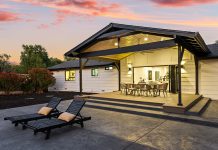SMART train officials recently took a reverse commute trip to Cloverdale after brief stop-offs in Windsor and Healdsburg to deliver updates on the commuter train project that was first launched by Sonoma and Marin county voters in 2008.
With the original 70-mile, 13-station train system cut in half and pushed back several years by the 2008 Great Recession, all the SMART officials could offer on their recent visits were free bus rides for Cloverdale, Healdsburg and Windsor commuters, seeking to board the new trains at Santa Rosa or south by the end of this year. The officials also offered other promises of bringing the trains north as originally planned, but they could not give a specific date or price tag, except to say they still need $225 million to finish the northern segment between Windsor and Cloverdale.
Meanwhile, north county taxpayers — along with all Sonoma and Marin taxpayers — will continue to contribute sales tax revenues to the project, as voted in 2008 as Measure Q. (To date, SMART has collected $160 million in local sales tax.) With a “track record” of multiple delays, poor budgeting, altered promises and multiple Grand Jury investigations, we urge Cloverdale, Geyserville, Healdsburg and Windsor residents to accept SMART boss Farhad Mansourian’s challenge and “keep the heat on.” At the Cloverdale meeting, he gave out SMART’s public phone number (794-3330) and told the small crowd to call him often for updates on the project.
With all the work and focus on the southern Phase I, no work has started on the 30 miles of northern track. Full engineering work for the Healdsburg railroad bridge has not been completed or announced.
There is no question a solution to Highway 101 congestion has been needed since before the 2008 Measure Q victory. Even with Highway 101 widening and improvements over the past decade, the rush hour delays have significantly worsened. With few options due to environmental constraints and historic land use patterns, a majority of voters saw the SMART commuter train as the best available solution. Extra support also was won by the promise of a $90 million pedestrian/bicycle trail the length of the rail project. (That project also has been delayed but recently extra trail funds were granted.)
Phase I of SMART is set to be completed late this year, Mansourian told the Cloverdale crowd. Rail lines have been constructed from near the Sonoma County airport to San Rafael, totaling 40 miles, with 10 stations ready to go. New train cars have been on practice runs and other preparations continue. In all, the first half of the SMART system will cost $427.9 million. That’s almost the original $500 million estimate for the entire 70-mile project.
Why might North County residents remain skeptical? Well, in the updated 2014 SMART Strategic Plan, a Phase II for Windsor to Cloverdale is only mentioned in passing without any dates, details or actual funding sources.
Carol Russell, a Cloverdale city council member, former mayor and longtime champion of SMART, continues to promise a train all the way to Cloverdale. But for now the Cloverdale Rail and Transit station dedicated east of town in 1998 will only be used for the announced bus shuttles, beginning in late 2016.
The bus shuttles will also stop in Healdsburg and Windsor twice daily during south and north bound commute hours and one trip at midday. How many north county residents will adapt their commute trips, abandoning their cars for a bus-to-train-to-ferry ride to San Francisco? Creeping along, bumper-to-bumper on Highway 101 is no way to move workers, commerce or the future. SMART’s Phase II promises need to become real work, real soon. Bus rides, free or not, can only go so far.
— Rollie Atkinson








